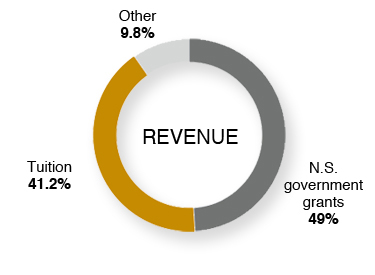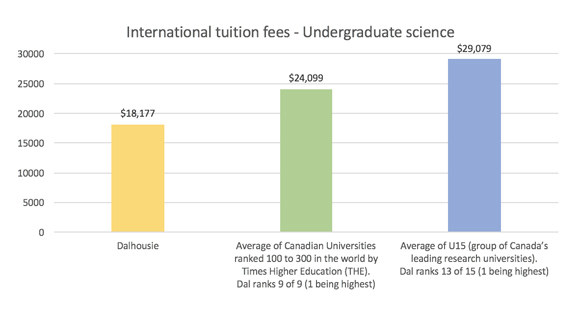The following overview is authored by Teri Balser (Provost, as well as chair of Dalhousie's Budget Advisory Committee) and Ian Nason (Vice-President Finance and Administration).
, Dalhousie’s Budget Advisory Committee (BAC) is recommending increases to international tuition fees: an additional $1,473 per year over four years for international students in undergraduate and non-thesis master’s programs. For 2019-20, this amounts to an average increase of 8.1%. Current international students would be exempt from the additional increase for the duration of their studies. These recommendations are currently with Dal’s Board of Governors for review and approval.
Learn more about Dal's budget: dal.ca/budget
  Â
This decision regarding international tuition fees is a difficult one, and follows significant discussion and deliberation within our committee and through our consultations across the university — not only this year, but in years previous. International students add to the diversity of our university community, bringing together individuals from around the world with unique cultural experiences and points of view. They also raise the international outlook and profile not just of Dalhousie, but also the city of Halifax, our province and region. And they are a growing part of our university community: there are 2,780 more international students at Dal today than there were in 2005-06 (a 226% increase), representing nearly 22% of our overall student body.
We understand why the decision to raise fees for future international students causes concern, even with the plan to exempt current students from the additional increase. We are listening and moving quickly to address those concerns as best we can — including the launch of a rapid task force to determine funding allocation needs for international student support.
Why it is necessary to raise tuition?
 Nearly all (90%) of Dal’s day-to-day operating funds come from just two sources: the provincial government (49%) and tuition fees (41.2%).
Nearly all (90%) of Dal’s day-to-day operating funds come from just two sources: the provincial government (49%) and tuition fees (41.2%).
Each year, it costs more and more to run the university: rising salaries for faculty/staff, student support services, repairs and renovations to classrooms and campus buildings, critical IT investments, and more. Faculties and service units have worked hard over the past decade to reduce and limit their costs, but after years of being asked to address the gap between revenue and expenditure increases, there is an impact on programs and services. Government funding, which increases by just 1% annually, is not nearly enough to cover our rising costs.
That leaves tuition fees as the only avenue available to the university to increase revenue and ensure our programs, our people, and our supports and services can receive sustainable funding.
Why raise international tuition in particular?
When Dalhousie considers where to set tuition fees, we ask many different questions. How much does it cost to deliver the program, and to do so at a high quality? What sort of demand is there for the program, and how might fee changes affect enrolment? And how do Dal’s fees compare to similar programs at other Canadian universities?
Over the period since 2005-06, Dal’s international student population has grown by 226%, and the university has received no increase in government support for these students. As well, international students, though adding greatly to diversity and richness of the campus, also put a larger strain on our support and teaching systems than domestic students. Across Canada, international students are expected to pay a greater portion of the full cost of their programs through their fees.
Dal’s international fees are significantly lower than other comparable universities in Canada:

Why are fees at many other universities so much higher? Because they have increased international fees over the past decade to better reflect the full costs of delivering quality academic programs. What’s more, these other universities have been able to increase fees while continuing to grow international enrolment at the same time.
We believe Dal can, and should, follow their model and increase international fees to better reflect and sustain the quality of our programs and as a measure to ensure more sustainable revenue for our university.
What do the fee changes amount to?
Currently, an international student studying towards a Bachelor of Science degree at pilipiliÂþ» pays $18,177 in tuition each year. The increase for 2019-20 amounts to an additional $1,473.
At the end of the four years, Dal’s international tuition should be in the $24-26,000 range for an undergraduate student. For comparison, here are current international tuition fees in 2018-19 for some comparator universities across Canada: University of Ottawa ($31,444), University of Waterloo ($30,562), Western University ($28,743), Simon Fraser University ($25,220).
What is our commitment to supporting international students?
As we’ve shared our budget proposals with the Dal community, we’ve heard from international students concerned that the services and support they receive at pilipiliÂþ» are not where they should be, given the amount of tuition they pay. We take these concerns seriously: if we’re going to ask future international students to pay more, we have to do more to ensure they have what they need to succeed at pilipiliÂþ».
The Provost’s Office has convened a rapid task force led by the Vice-Provost Student Affairs, and comprised of international student representatives, administrators and others. It will thoroughly review support currently in place for international students and determine what improvements should be made, and where additional funding should be allocated. This will include things such as
•   access to financial aid and experiential learning
•   the Writing Centre
•   career advising
•   accommodations
•   health/well-being
•   teaching support for classes with high international student enrolment
This task force is being assembled now, and seeks to report by the end of June with recommendations for fall 2019 and beyond.
The recommended budget includes an allocation of $700,000 specifically towards supporting international students. The budget plan also sets aside $500,000 in new funding for student experience initiatives as well as $500,000 for financial assistance. We are also allocating additional student assistance funds for international students beginning their programs in fall 2019, recognizing that some of them are committing to Dalhousie while final decisions about international tuition are still being made.
Finally, the Budget Advisory Committee is going to continue to meet through the year to monitor, among other things, how our budget model is supporting student pilipiliÂþ» and our growing international student population.
We are appreciative of the time and care that so many have taken in providing input on our budget recommendations. The budget pressures Dalhousie faces are many, but we are committed to listen, to learn and to work with you in building an operating budget that ensures everyone who studies and works here can fulfill their hopes and aspirations as part of the Dal community.Â
Teri Balser
Provost and Vice-President Academic
Chair, Budget Advisory Committee
Ian Nason
Vice-President Finance and Administration
